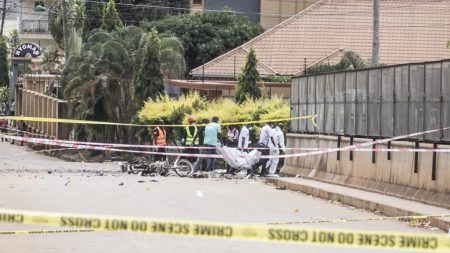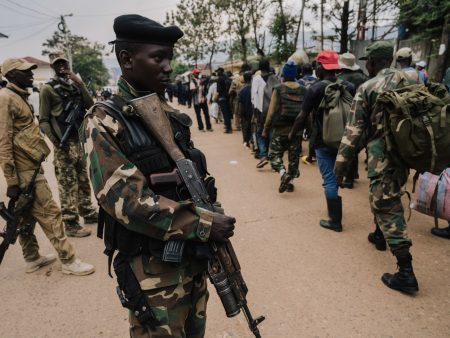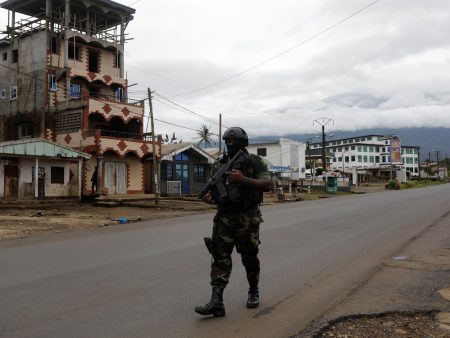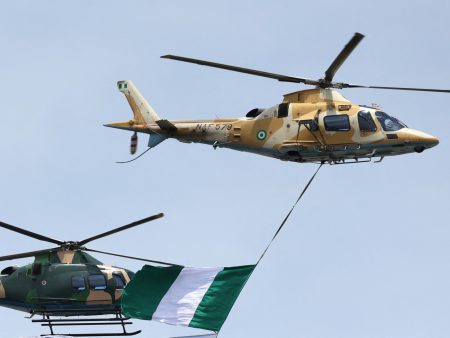In a devastating turn of events during a recent football match in N’Zerekore, Guinea, at least 56 people have been reported dead following violent clashes that erupted after a controversial referee decision. The tragedy unfolded on a Sunday afternoon when rival fans stormed the pitch, leading to chaos and a stampede amid the growing unrest. According to government statements, the situation escalated as protests over refereeing led to stone-throwing between supporters, ultimately resulting in numerous injuries and deaths. Local hospitals were overwhelmed with casualties, highlighting the severity of the incident, with one doctor commenting on the appalling conditions as the morgue reached full capacity.
The confrontation began when supporters of the visiting team, Labe, expressed their anger over what they deemed biased officiating by hurling stones onto the pitch. Police responded with tear gas to disperse the agitated crowd, but this only intensified the situation. Following this initial outbreak of violence, demonstrators turned their anger towards the local police station, vandalizing the facility and setting it ablaze as tensions continued to rise. Eyewitness accounts indicate that the unrest was largely a reaction to the referee’s decisions, leading to chaos both on and off the field as fans invaded the pitch in protest.
The match was organized as part of a tournament in honor of Mamady Doumbouya, Guinea’s military leader, who came to power via a coup in 2021. The tournament is viewed by critics as a political maneuver aimed at bolstering Doumbouya’s image ahead of a possible presidential run, with opposition groups condemning these events as efforts to legitimize his rule in an undemocratic manner. The National Alliance for Alternation and Democracy (ANAD), a coalition of opposition parties, has openly criticized the tournament as an illegitimate tactic to promote Doumbouya’s political ambitions, reflecting the ongoing political strife in a country still reeling from military governance.
Since seizing power in September 2021, Doumbouya has effectively sidelined the previous democratic government and has faced pressure to return to civilian rule by the end of 2024. However, indicators suggest that he may not adhere to this timeline, especially following his recent promotions within the military ranks. Doumbouya’s rule has been marked by a significant crackdown on dissent—many opposition leaders face imprisonment, legal challenges, or exile, fostering an atmosphere of fear and repression that stifles political opposition.
Doumbouya’s military government introduced a “transitional charter” prohibiting military personnel from participating in national or local elections, a mandate that is now being scrutinized as his supporters vocalize backing for his presidential aspirations. The government has indicated that the restoration of constitutional order and proposed elections will be delayed until 2025, raising concerns among both citizens and political commentators about the genuine prospects for democratic governance in the near future. This delay, coupled with Doumbouya’s consolidating military power, signals a troubling trajectory for Guinea’s political landscape.
Amidst these developments, the incident at the football match has underscored the volatile situation in Guinea, where sports and politics intertwine dangerously. Football, often a unifying force, became a catalyst for violence in this context, illustrating how unresolved political tensions can erupt into public disorder. The loss of life and the subsequent harassment of citizens during the unrest reflect broader societal frustrations and indicate a pressing need for dialogue and conflict resolution. Guinea’s future remains uncertain, and the spiraling violence at a sporting event serves as a grim reminder of the fragility of civil order in the face of ongoing political turmoil.










